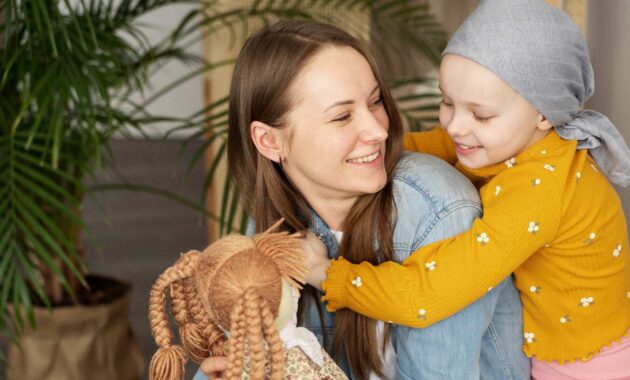Childhood cancer survivors will need medical care for long. Don’t leave everything to the doctors. On World Cancer Day, know a few ways parents can care for childhood cancer survivors.
Every parent whose child gets diagnosed with cancer eagerly waits for their kid to beat it. Once the treatment for childhood cancer is done, it brings great joy. But as you celebrate, you may also worry about the return of cancer. Even though there will be no more chemotherapy, follow-up care will be required. You will continue to take your child to the doctor for check-ups. But your job won’t end there. You will have to care a lot for your child after cancer treatment. On World Cancer Day, which is observed on February 4, let us tell you some ways to care for childhood cancer survivors.
Every year, about 400,000 children aged between 0 and 19 develop cancer, as per the World Health Organization (WHO). Comprehensive services are generally accessible in high-income nations, so more than 80 percent of children with cancer get cured there. The figure is much lower in low- and middle-income countries, where less than 30 percent children are cured, according to the WHO.

What are the common types of childhood cancer?
Leukaemia, brain tumour, neuroblastoma, Wilms tumour (kidney cancer), lymphoma, and rhabdomyosarcoma are among the common cancers among children, says senior medical oncologist Dr Manish Sharma. Although juvenile cancers are less common than adult malignancies, they nevertheless need to be treated with specialised care. Medical research advancements keep improving the prognosis for youngsters with cancer.
What can parents expect at childhood cancer survivor’s follow-up visits?
Parents of childhood cancer survivors can anticipate routine check-ups, treatment side effect monitoring, and conversations regarding the child’s general health and well-being during follow-up appointments. Screenings for potential side effects, such as organ failure or secondary malignancies, are frequently included of these appointments. Parents should be ready to have conversations with their children regarding their emotional health, any psychological affects, and ways to deal with any aftereffects of the cancer experience.
Also Read

Will the child have lingering side effects from cancer treatment?
Childhood cancer survivors may experience lingering side effects from their treatments, known as late effects. These can vary depending on the type of cancer, the specific treatments received, and individual factors, says Dr Sharma.
Possible late effects may include:

Healthshots Inner Circle An exclusive wellness community for women
JOIN NOW
- Physical issues: Organ damage, growth abnormalities, hormonal imbalances, and impaired fertility are common concerns.
- Cognitive and learning challenges: Some survivors may face difficulties with memory, attention, and learning, potentially impacting their academic performance.
- Emotional and psychosocial effects: Anxiety, depression, and post-traumatic stress disorder (PTSD) can arise due to the emotional toll of the cancer experience.
- Secondary cancers: Certain cancer treatments may increase the risk of developing secondary cancers later in life.
- Cardiovascular problems: Radiation and certain chemotherapy drugs may affect the heart, leading to cardiovascular issues.
- Endocrine disorders: Hormonal imbalances can result from cancer treatments, affecting growth, puberty, and overall endocrine function.
Regular follow-up visits with doctors are essential to monitor and address any late effects promptly. This will enable early intervention and improve the long-term health outcomes for childhood cancer survivors.
Select Topics of your interest and let us customize your feed.
PERSONALISE NOW

What are the ways parents can care for childhood cancer survivors?
Apart from meeting with the doctors, parents can do the following:
1. Healthy lifestyle promotions
Encourage a balanced and healthy lifestyle, including nutritious diet choices, regular exercise, and adequate sleep. This will help to support your child’s overall well-being and recovery, says Dr Sharma.
2. Emotional support
Provide emotional support by fostering open communication, addressing your child’s feelings and concerns. You can also take professional help if needed to cope with the emotional challenges post-treatment.
3. Educational support
Collaborate with teachers and school staff to address any learning difficulties or cognitive challenges your child may face. This will ensure appropriate accommodations and support in the educational setting.
4. Screening for late effects
Be vigilant for signs of potential late effects and work closely with doctors to ensure timely screenings and interventions. This includes monitoring for secondary cancers, cardiac issues, and hormonal imbalances.
5. Encourage independence
Foster your child’s independence and self-management skills as they transition back to normal life, promoting a sense of control and confidence in managing their health.
6. Connect with support groups
Explore support groups and connect with other families who have experienced childhood cancer. Sharing experiences and advice can provide emotional support and practical insights, says the expert.
7. Advocate for comprehensive care
Be an advocate for comprehensive care, ensuring that your child receives coordinated and multidisciplinary support from doctors, addressing physical, emotional, and educational needs.
8. Address psychosocial well-being
Recognise and address any psychosocial challenges your child may face, such as anxiety or depression. You can seek professional counselling or therapy when necessary.
9. Promote healthy habits in siblings
Extend care to your child’s siblings by helping them understand and cope with the impact of childhood cancer on the family dynamic. Encourage open communication and provide emotional support for the entire family unit.
Caring for childhood cancer survivors involves a holistic approach, and parents play a crucial role in helping their child transition successfully into survivorship and lead a healthy, fulfilling life after cancer.
#World #Cancer #Day #ways #care #childhood #cancer #survivors
